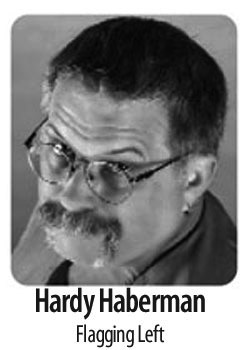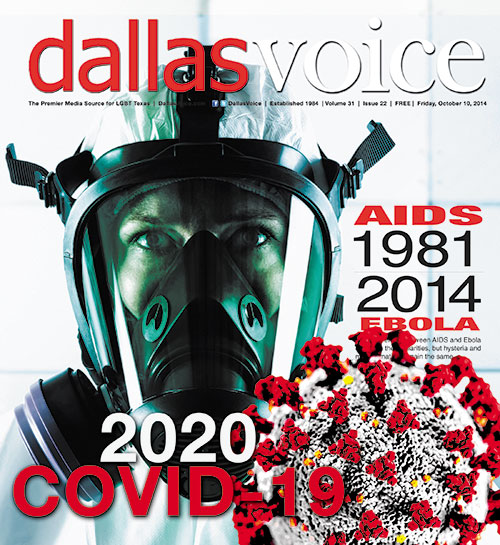 I got news recently that another friend had been hospitalized with COVID 19. They told me he was on a ventilator and had only a 10 percent chance of surviving. He is not the first of my friends to get sick, and I suspect won’t be the last.
I got news recently that another friend had been hospitalized with COVID 19. They told me he was on a ventilator and had only a 10 percent chance of surviving. He is not the first of my friends to get sick, and I suspect won’t be the last.
I am reminded of the dark times of the 1980s, when friends were wasting away from the newly-diagnosed human immunodeficient virus — HIV — and the ensuing complications that made up the diagnosis of AIDS. I watched far too many friends become ill and die and this latest pandemic is very reminiscent of the previous one.
The big difference is that, in the 1980s when friends were dying in hospital beds hooked up to IV lines and machines, we could at least be with them. We could hold their hands; we could hug them. Now we are relegated to saying our goodbyes over Zoom or social media. The pain of this isolation is palpable for all of us still; we ache to touch and hold and comfort physically, not as a disembodied voice on a cell phone or face on a computer screen.
I suspect I am not the only one who is experiencing this melancholy déjà vu. And it doesn’t end with the COVID-19 pandemic. The weeks and weeks of marches and protests and police brutality are playing out like the 1960s and 1970s again. I was one of those who marched in the streets back then — marched against the war; marched in support of civil rights; marched for LGBTQ Liberation.
I would never have imagined back then that today, these decades later, we would still be marching for the same reasons!
 Apparently, our country has a hard time learning from its mistakes.
Apparently, our country has a hard time learning from its mistakes.
Here in Dallas in 1973, a young boy names Santos Rodriguez was murdered by police who were playing Russian roulette while interrogating him. It was a horrible example of racist hatred and police brutality, and Dallasites marched in the streets, demanding justice.
You would think our city and police would have learned a valuable lesson from that tragedy. Apparently not.
Instead, police have become para-military squads that resemble an invading army rather than men and women sworn to protect and serve their own community.
Jim Crow laws were designed to extend the disparity of rights that was left over from slavery. And even though millions marched in the streets — all the way to Washington, D.C. — and even though the segregation of the 1950s and 1960s ended, the economic segregation did not. Still today, beyond the police actions against people of color, we have an underlying undercurrent of racism in employment and economic opportunity that works still to suppress black and brown Americans.
America is slow to learn from its mistakes.
If there is any good news to be found today in this miasma of déjà vu, it has been the recent Supreme Court ruling affirming the rights of LGBTQ Americans and protecting us from workplace discrimination. It is a landmark ruling that will have far reaching effects, though it may take some time before effects truly become evident.
The other dim light of good news comes from our Dallas County judge, Clay Jenkins, who instituted mandatory wearing of masks in Dallas County businesses. Studies have shown that if the population wears masks and practices rigorous hygiene practices COVID-19, transmission rates drop drastically. It is, again, a little bit of déjà vu for me, since my father was an immunologist and microbiologist, and he always taught me that hand washing could prevent a multitude of diseases.
In the meantime, though, this pandemic is not over, not by a long shot. Though the state and national governments are pushing to reopen shops and businesses, the engines of our economy, we still do not have a viable vaccine or a universally accepted treatment for COVID-19. I sincerely hope our country can respond to this crisis with some common sense and put every effort into finding not just a cure, but a way to mitigate the spread and minimize infections.
That means we will have an important choice to make on Nov. 3. That election might be the most important one in our lifetimes. I hope we have learned something from our past and that we get it right in November.
In these historic and chaotic days, I am reminded of a quote from Winston Churchill: “You can always count on Americans to do the right thing — after they have tried everything else.” I hope we don’t have to wait that long.
Hardy Haberman is a longtime local LGBT activist and a board member of the Woodhull Freedom Alliance. His blog is at DungeonDiary.blogspot.com.













I still think things are somewhat better.
Spanish can be spoken in the classroom now and the person doesn’t ng it is not sent home for the day.
The lot if minority people are holding good jobs.
There is treatment for HIV.
Nothing is ever petfect
I should like to remind everyone that there is more testing being taken and thus a rise in the number of cases being reported. Deaths due to COVID have been decreasing, yet the liberal media is pushing yet again a false narrative to those whose heads can be turned whichever way the liberal media wants.
I knew three people who came down with COVID, were each given Hydroxychloroquine + two steroid shots several weeks apart. Each are in good health and each made a full recovery. What was the condition of this author’s friend who succumbed to COVID?
Also, having family members within the medical field each as stated that the hospitals they work at (both within and outside Texas) are NOT filling up with COVID-19 patients. This brings to mind about the two Medic ships brought into NY Harbor and CA, but there were less than 100 when both states were asking for federal aid to combat the virus.
The liberal media is pushing a false narrative down America’s public throat. They spewed pretty much a false narrative about President Trump and the the Russia Collusion, and when that all fell apart we no longer hear about a push to impeach the president, but now each seems focused on a new concern…COVID-19, and the lack of help the president is doing to combat the view. Remember when, Rahm Emanuel, the the former Whitehouse Chief of Staff said, “NEVER LET A CRISIS GO TO WASTE.” Friends this is what is taking place right now with COVID. The November elections will be here soon, and the left are pulling out any ‘crisis’ they can muster to defeat president Trump. The false narrative they pushed when claiming there was a Russia-Collusion.
So, they gave up on that narrative, and then began using this NEW crisis with COVID to say that President Trump has done NOTHING….really? I remember he sent two medical ships to two harbors to assist state governors in their fight of this pandemic. He had companies mass produce face masks, for healthcare workers, while a certain politician in NY had a WHOLE warehouse full of masks and never gave them out, only until after they were discovered.
For Texas to achieve and maintain political, cultural, and economic independence, we have to strive for the best government we can get right here at home. As part of that effort, I was introduced to a video of the Collin County Commissioners Court from back in May. While most of the meeting contained otherwise mundane details that go along with running a county, it was one section about the county’s COVID-19 response that left me stunned. In the video a spokesperson from the Dept. of Health Services on case definitions (COVID-19 related). What is interesting is the revised federal guidelines now say ANYONE, even if not tested but comes into contact with someone who HAS tested positive will be labeled as having had COVID, even though no testing was conducted. Case in point: A friend who works for one of the major airlines in Dallas went to a legal testing facility to be tested for COVID. After waiting for almost three hours she and her family got up and did not get the test taken; However, after she reported back to work two weeks later she was informed she had tested positive for the virus, but again…she NEVER had the test taken. That begs the question, how was a test conducted…when the patient was not there to be tested, but the test came back positive. We are seeing this happening statewide, as well as nationwide.
I believe the COVID was an excellent scenario to play out as a ‘dry-run’ by government officials to see how well they can control the population.
Think about this: When somebody comes down with the flu…nothing is too out of the ordinary, and more deaths from the flu happen than that of COVID-19, yet more emphasis is being placed on COVID, only because it is being sensationalized by the media and those willing to buy into the propaganda being pushed. Explain why nothing happened to all the protesters in Seattle, L.A., and elsewhere who did NOT social distance? Even if these people came down with the virus, it is NOT a death sentence like AIDS was at the onset.
This is more about politics…and I want to see exactly how this all plays out after the November elections. I think what we’re seeing is the left of society trying to do anything possible to ensure Trump does not win (but he will) and to keep people as ‘sheeple’ by buying into fear mongering on both media outlets and social media.
Also, here is a simple test you can do at home. Using Google, type in the search field ANY three (3) digit number, then type the words new cases (e.g. 123 new cases). It will give you the exact NEW cases with the number you choose to use. This is how bogus all the false narrative is being spewed.
Have you ever stopped to think about how the federal government, the State of Texas, and other local agencies actually define a COVID-19 “case”? To every common person in Texas, it seems to be a simple matter. You either have the virus or you don’t. If you’re in government, it’s not as simple as that. Even the infamous Dr. Fauci can’t keep his message clear. First we were all told masks needed to be worn, then a couple months later he changed the narrative to ‘suggested’ wearing masks. Then a month later he claimed masks don’t really do anything, but keep the person wearing them safe. Which is it Dr. Fauci? Once people wake up and realize they’re being led like lambs to a slaughter will they see what is taking place. I call this the ‘sheeple’ effect…people will do exactly what is told of them…because they are ‘useful idiots’ (Hitler used this term to describe how he could control the people of Germany. Tell somebody something long enough…they then begin to believe it.